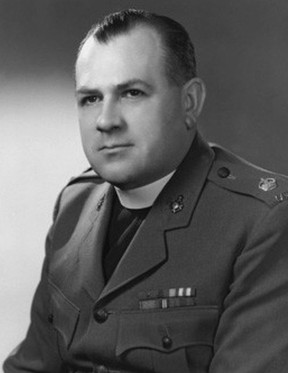An Ontario native received a prestigious award for his incredible bravery during World War II in Dieppe, France.
Contents of the article
Bruce Forsyth
Advertisement 2
Contents of the article
The Victoria Cross is the highest and most prestigious award for gallantry in the face of the enemy that can be awarded to British and Commonwealth military personnel during war.
Contents of the article
Contents of the article
Only one award was presented to a member of the Royal Canadian Chaplain Service, namely Honorary Lieutenant Colonel Rev. John Weir Foote, VC, CD.
Rev. Foote was born May 5, 1904 in Madoc, Ontario. He was educated at the University of Western Ontario and Queen's University. He then attended Montreal Presbyterian College, McGill University, graduating from the theology program.
Foote was ordained as a Presbyterian minister and served congregations in Fort Coulonge, Quebec, and Port Hope, Ontario.
With the outbreak of World War II, many young men enlisted in the Canadian Armed Forces. Reverend Foote felt the call and in December 1939 enlisted in what became known as the Royal Canadian Army Chaplain Corps. He was promoted to the rank of honorary captain and assigned to the Royal Hamilton Light Infantry (Wentworth Regiment) in Hamilton, Ontario as their regimental chaplain.
Contents of the article
Advertisement 3
Contents of the article
When the 1st Battalion, Royal Hamilton's Light Infantry (RHLI) was sent to England in July 1940, Captain Foote went with them.
On 19 August 1942, the RHLI was stationed on the beaches of the French port of Dieppe as part of Operation Jubilee, marking the second time the Canadian Army entered combat in the Second World War.
The chaplain's bravery is absolutely incredible.
At 38, Foote was sent with the regiment, although he was not originally supposed to take part in the raid. Lieutenant colonel. Robert Labatt, the commander of the 1st Battalion, changed his mind after Foote told him that he was indeed going on a raid and that he (Labatte) could arrest him on the boats for disobeying orders.
Once ashore, the burly chaplain joined the regimental aid post, helping the medical officer and the wounded soldiers both spiritually and physically. The descriptions of his bravery that day are absolutely incredible and inspiring.
Advertisement 4
Contents of the article
During the eight hours that RHLI was on the beach, Foote transported more than 30 wounded soldiers to the aid station while enemy fire rained down around him.
Read more
For Foote's actions that day he was awarded the Victoria Cross.
His quote reads in part:
“…with complete disregard for his personal safety, the honorable Captain Foote exposed himself to fire and saved many lives by his valiant efforts…his example inspired all around him. Those who watched him affirm that the calmness of this heroic officer as he went about collecting the wounded on the fire-torn beach will never be forgotten.”
Advertisement 5
Contents of the article
When the time came to evacuate, Foote volunteered to remain with those who could not be evacuated so that he could provide pastoral ministry to those who needed them.
Foote, who had not seen combat, were not allowed to carry a rifle in combat. However, during the evacuation, Foote grabbed a Bren pistol and provided cover for his comrades as they evacuated the beach – a rather unusual act for a padre. Apparently, on that day, Foote took an oath to bring people closer to God too literally.
Foote was captured along with 173 other members of the RHLI, including Lt. Col. Labatt. He remained a prisoner of war until his release on May 5, 1945.

Upon returning to Canada, Foote decided to remain with the Royal Canadian Army Chaplain Corps and was posted to Camp Borden in September 1945 as a senior Protestant chaplain with the rank of major. He settled in the nearby town of Barry, at 135 Mulcaster Street.
Advertisement 6
Contents of the article
On 28 March 1946, Foote went to Buckingham Palace where King George VI formally presented him with his VC, becoming the only member of the Royal Canadian Chaplain Service ever to be so honoured.
Foote remained at Borden and the Chaplain Corps until he was finally released from the Army in 1948. That same year, Foote left the pastorate to pursue a career in politics, winning a seat in the Ontario Legislative Assembly as the Conservative member for Durham County. He held this position until his retirement from politics in 1959.
In 1964, Foote returned to the RHLI with the rank of honorary lieutenant colonel. He resigned this position in 1973.
Another honor given to Foote during his lifetime was the naming of the Cobourg branch of the Royal Canadian Legion in his name in 1982.
Rev. Foote lived with his wife Edith in Cobourg, Ontario until his death on May 2, 1988. He was buried in Cobourg Union Cemetery.
The James Street Armory in Hamilton, home of the RHLI, was renamed the Lieutenant Colonel John Weir Foote, VC, CD Armory in September 1990 in his honour. Foote's medals are on permanent display at the RHLI Museum.
– Bruce Forsyth is a former RCN reservist, freelance writer and military historian who publishes articles on www.militarybruce.com
Contents of the article










